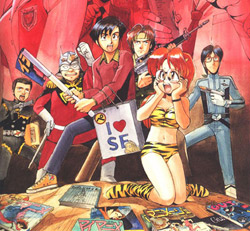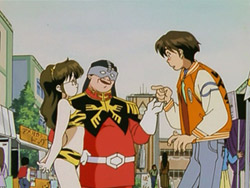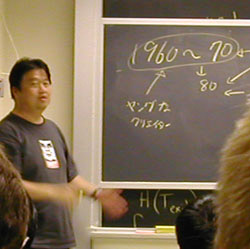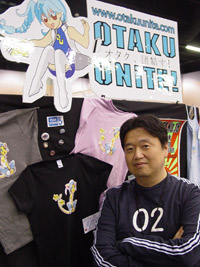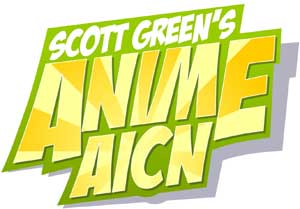 Logo handmade by Bannister
Column by Scott Green
Logo handmade by Bannister
Column by Scott Green
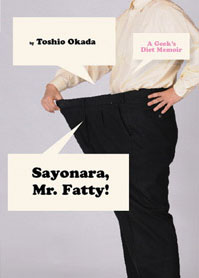
Sayonara, Mr. Fatty! A Geek's Diet Memoir by Toshio Okada Released by Vertical Inc.
It's faded from North American consciousness, but in the years before "otaku" became a dirt common phrase in the geek lexicon, there was "Otaku no Video." The parody documentary, produced by Evangelion home studio Gainax, followed a normal, well adjusted college student - a guy with a girlfriend and in interest in tennis - who is indoctrinated into the world of hard core geeks. After leaving the girl in favor of a life of opening model shops and producing anime, he too is striving to be the otaku who other otaku bow before, the geek of geeks, the "OtaKing."In reality, the "OtaKing" is/was co-founder and former president of Gainax Toshio Okada. As Matt Alt translates in his review of "You Otaku are Already Dead" Okada was the model "Otaku 1.0" from the Eighties: "individuals who chose to pursue childish hobbies as a means to intellectually and emotionally isolate themselves from society." And, he found success within that world of ubergeeks. In addition to scripting Otaku no Video, and contributing to anime's spectacular love letter to anime: Gunbuster, he literally wrote the book on otaku, Introduction to Otakuology. After leaving the anime business Okada became a cultural critic, even serving as lecturer of Otakuology at Tokyo University. Then, in recent years, Okada found religion (figuratively). He dropped a hundred pounds. He began describing the current generation of otaku as "a growing ghetto of weak individuals who blame society when others fail to understand their personal interests." From Carl Horn's response to an anecdote about Naohito Tanobe, editor in chief of Eiga Hi-Ho, Japan’s Movie Treasures magazine, visiting Burger King to collect a Star Wars Episode III figure from a BK Kid’s Meal. At the notorious Otakon 1995 (notorious, for its odd early venue--at a student center deep in Pennsylvania's farm country) Toshio Okada boasted of his journeys to the America of James Earl Carter, returning to Japan in a great many-pocketed trench coat full of four-inch Kenners for resale ("How'd you get that scar? Eatin' Pocky?"). At Anime Weekend Atlanta 2003 it was a different story. Much of Okada's storied bulk was gone, and his personal separation in time from the underground base of Daicon Film and Gainax, into the realm of writing and academia (he was in fact at AWA on his way to lecture at MIT) was much more evident in his manner. It was instead the director, Hiroyuki Kitakubo, who talked all night, bouncing fast-thinking film ideas around, carried through the great courtesy of Taka's interpretation. Lawrence Eng on Okada's 2003 MIT visit When I asked Okada whether or not he kept in contact with his former Gainax colleagues, he replied that he hadn't spoken to any of them in three years. When I asked him his opinion of the recent Gainax releases, he said they were boring, and that (Hideaki) Anno should direct anime again (as opposed to Hiroyuki Yamaga, I presume). Also see Toshio Okada on the Otaku and Anime Toshio Okada on the Otaku, Anime History, and Japanese Culture Okada in 2007 via Otaku Unite Sayonara, Mr Fatty doesn't spell out Okada's evolving perspective on otaku, in fact, there is little in the book that explicitly concerns anime or its devotees. What the book does capture is the mindset and process by which Okada dropped over 100 pounds in a year. He speaks about the transformation with the zealousness of a convert. It's a clear, cogent argument, expressed with complete conviction. I'm a successful dieter who lost 100 pounds in a year. My weight went from 260 pounds to 150 pounds. Who expected such a change a year ago? I certainly didn't - but I guarantee it's true. Everyone asks me: "What kind of extreme diet did you go on?: and "What's the secret?" I didn't do anything special, or use any secret technique. I didn't spend extra money. I didn't suffer. I didn't limit myself to particular foods. I didn't have liposuction. I didn't go to a gym. I didn't take any special supplements. I didn't buy a fitness machine or a sweat suit. I never visited a heath spa or a weight-loss clinic. I didn't eat any diet food. I'm not going to buck the standard of framing the diet review book with a bit about my personal weight and physique. I am by no means athletic, but I would call myself physically fit. I wrestled in high school. I've been going to the gym multiple times a week for about a decade and have been practicing jiu jitsu recently. If I have a weight issued, it's that I can't put much muscle. As such, the diet scaffolding of Sayonara, Mr Fatty! did not interest me as much as the philosophy and mental process behind it. The label "otaku" has adhered to some expansive definitions in recent years. There's "otaku" as a label for anyone who watches anime. There's "otaku" as a label for a dedicated pursuer (or consumer) of any interest.. "Fashion Otaku" "Hiking Otaku." Then, there's a definition of "otaku" that pins the concept to obsessive dedication... the person who'll take time off work to ensure that they get the ticket to a movie premiere, who'll passionately argue about the minutia of a fictional world, who'll compulsively poll eBay auctions to make sure they land the sought after action figure, who'll skip sleeping to write an online column. In Japan, the term's connotations have oscillating over the years, highlighted by the figures with which it is identified, from "The Otaku Murderer" Tsutomu Miyazaki in the early 90's to the early 00's supposedly true romantic fable of "Densha Otoko" or "Train Man." However, even in the mildest judgment: the person who knows too much about a useless interest and consumes to much in pursuit of that interest, devoting excessive time, money and energy to non-socially productive pursuits, there's an unhealthy quality to the otaku life. Okada's diet innovation is to take that otaku obsessiveness, and channel it towards personal betterment. If you're going to compulsively record something, record what you're eating. Start with a note pad, physical and/or digital and begin writing down what you're eating. Make sure you inscribe all of it. Then, you begin noticing patterns. What was unthinking habit and false assumptions can be intellectualized. Okada describes how he was able to observe, interrupt and then end his snacking routines; how he was eating food that he didn't really enjoy; how there were healthy, satisfying elements of his diet buried in an avalanche of food he could do without. Then, Okada develops strategies for being able to eat what he wants without disrupting his weight loss aims. Craving potato chips, he buys a bag, selects the best five chips from the package (obsessive much?), eats those five, runs water over the rest, and tosses it out. He hasn't overcosumed. No one is worse off for having rendered the rest inedible. Sayonara, Mr. Fatty strikes me as the diet book of the Obama era, marked by faith in the ability of disciplined intelligence to outsmart a challenge. Pessimism and concern about intractable problems aside, in this case, I buy it. I'm not a dietician, a nutritionist or even someone remotely knowledgeable about the subject, but as a geek/otaku, I am conditionally convinced. I think if you're an otaku personality type like Okada, if you can adhere to a process, he's outline a sustainable strategy for losing weight and keeping it off. Conversely, if the premise sounds like irritating office work, if you have no desire to plan your diet like a World of Warcraft raid, Okada's strategy is probably a non-starter. Okada appears to be a creature of extreme dedication and organization. I don't think you can produce amateur animation like the Daicon III and IV convention openings or launch a commercial animation venture with Wings of Honneamise - The Royal Space Force without being at last borderline obsessive. Having tendencies in that direction seems to be a perquisite for finding success with Okada's "recording diet." Early on, Okada notes that if you diet and achieve results you'll provoke reactions. Inevitably among those acknowledgments will be offers of advice and disagreement with you're dieting methodology. Throughout Sayonara, Mr. Fatty!, Okada goes back and rationalizes the steps towards thinness: the decision to change how people perceive you, the decision to approach this through weight loss, the decision to achieve weight loss through the recording diet. The process of building these arguments is a fascinating exercise in otaku-think, erected with risk/reward, cost/benefit analyses. At the same time, you can see the gears of "You Otaku are Already Dead" beginning to turn. In what seems to me to be characteristically otaku fashion, Okada works through his dieting narrative alternating between enthusiasm and dispassionate analysis, meanwhile masking argumentativeness. Personally, as someone who is kindof thin and kindof fit, I think that working towards being fitter is a better idea than working toward being thinner, but as a student of otaku-dom, I can certainly appreciate the chart in which Okada evaluates five models of exercise and ranks them against ten other weight loss strategies. The geek might shrink by 40%, and in doing so, he might reevaluate his former, chubby self, but dammit, you're not going to stop that geek from expressing his suppositions in a 140 cell matrix. From diet methods to Otaku 1.0 versus 2.0, Okada certainly has not exorcised the geek mania for categorization and evaluation. In terms of usefulness, if you share a bit of Okada's geek mindset, I can see Sayonara, Mr. Fatty! being a valuable tool. Shrunken girth or not, Okada is a big personality, and as translated by Mizuho Toyoshima, his words form a brisk, persuasive read. Okada is/was an alpha geek; the kind who's sure to be the subject of a nerd cult of personality. As such, it's difficult to entirely avoid getting caught up in the excited reasoning. Going into the book with no plans to change anything in my own eating, I came away strongly considering Okada's observations. For those who had heard of Okada and were looking forward to reading the Otaking in English, Sayonara, Mr. Fatty! is less explicitly about the topics for which he's known than might have been hoped. It is both rewarding and revealing. I do feel that it is a valuable illustration of otaku think and otaku problem solving. Yet, it's like Alice Cooper talking golf: interesting, but not the main attraction and a bit dissonant. As the only Toshio Okada book available in English, definitely add a copy to your nerd library. Just make sure to adjust your expectations for a book that is focused on dieting (there's a late note about how the recording method could be used to correct other troubles, such as personal finance), and not geek subject matter.

